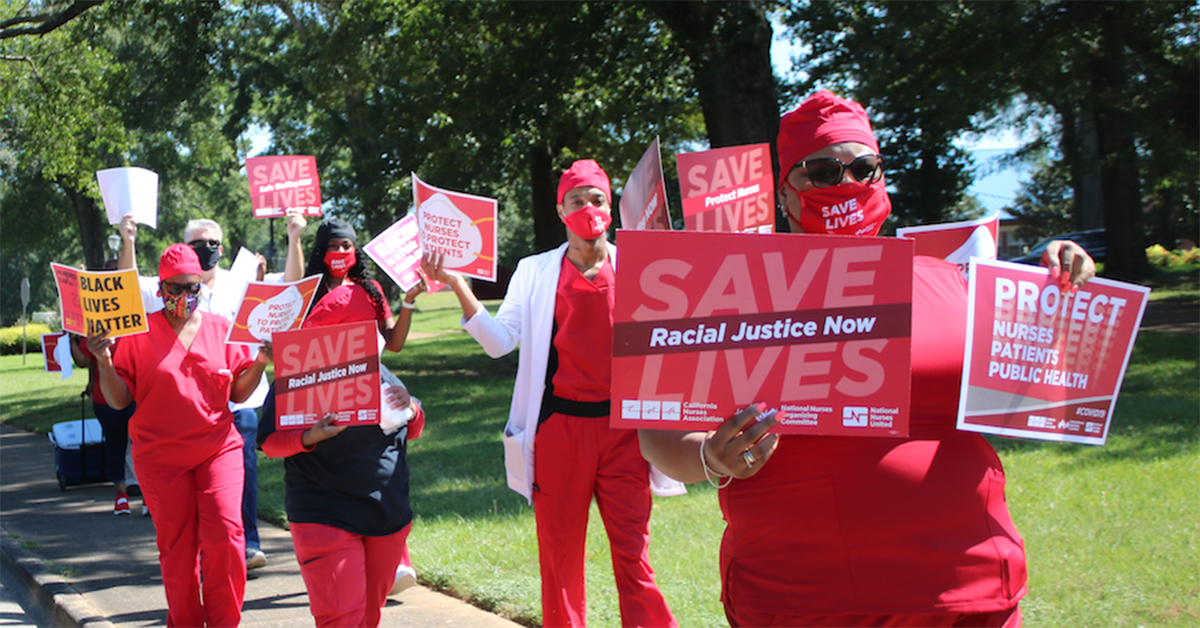Press Release
National Nurses United statement on racial justice

National Nurses United (NNU) stands with the family of George Floyd and the millions of people who took to the streets last summer demanding true justice and social change. NNU calls for a public commitment to solutions to end structural racism and promote social equity and healing.
Whatever the outcome of the trial of former Minneapolis police officer Derek Chauvin, nurses are committed to fighting against structural racism in our public safety, health care, and social systems.
“As nurses, we know that racism is a public health crisis,” said NNU Executive Director Bonnie Castillo, RN. “We have seen the impact of racism on the lives of communities of color during the pandemic — from the disproportionate deaths of Black, Latinx, and Indigenous people due to Covid-19 to the recent xenophobic attacks against Asians. We have a duty to speak out to end the suffering caused by an out-of-control system of policing and to demand transformational changes in policing practices.”
NNU advocates for:
- Comprehensive and systematic changes in policing practices, including stronger de-escalation methods to limit the use of lethal force, the elimination of racial profiling, and greater independent public oversight and accountability.
- Ending the system of qualified immunity to hold police officers accountable for their conduct.
- Condemning the use of terminology such as “excited delirium” and other racist pseudoscience used to criminalize Black, Indigenous, Brown, and all people of color (BIPOC), and justify excessive use of force, including overuse of powerful and often lethal sedatives.
“We treat our patients with care and compassion, no matter who they are, regardless of their beliefs, gender identity, race, or ethnicity,” said Zenei Triunfo-Cortez, RN and a president of NNU. “George Floyd was not treated as a human being deserving of respect and care. Every person has the right to live with dignity. Police officers must be held accountable for their actions.”
“When nurses see a patient in crisis, we immediately intervene to stop the suffering,” said Cathy Kennedy, RN and a vice president of NNU. “As nurses, our care work is guided by our calling not only to save lives and restore patients so they can go back to their daily lives, but also to restore communities who are harmed and killed by structural racism. We are committed to the struggle for racial justice.”
Nurses know that our call to care is a lifelong mission and that the struggle for racial justice is hard work that will take time. As we continue the fight against structural racism, we must:
- Demand transformative changes to protect the health, safety, and personal security of all people, including the right to live in an environment free of fear of violence and discriminatory treatment based on race, ethnicity, national origin, gender, religion, sexual orientation, gender identity or expression, disability, or immigration status.
- End the excessive increase in public spending on policing and prisons to reinvest in public health, mental health services, public education, job programs, housing, nutrition, transportation, daycare, retirement, and at-risk youth programs.
- Ensure marginalized communities have equal access to health care.
- Stop corporate health care industry practices that disproportionately impact BIPOC patients and nurses, such as hospital closures and service cuts.
- Protect BIPOC political rights by supporting legislation that expands the right to vote.
- End workplace discrimination and anti-worker policies (such as right to work legislation) that disproportionately affect workers of color and immigrant workers.
We honor the life of George Floyd—and countless others lost to police violence. We take this moment to renew our commitment to transforming public safety and our justice system.